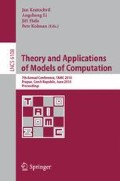Abstract
An instance of the max k −cut game is an edge weighted graph. Every vertex is controlled by an autonomous agent with strategy space [1..k]. Given a player i, his payoff is defined as the total weight of the edges [i,j] such that player j’s strategy is different from player i’s strategy. The social welfare is defined as the weight of the cut, i.e. half the sum of the players payoff. It is known that this game always has a pure strategy Nash equilibrium, a state from which no single player can deviate. Instead we focus on strong equilibria, a robust refinement of the pure Nash equilibrium which is resilient to deviations by coalitions of any size. We study the strong equilibria of the max k −cut game under two perspectives: existence and worst case social welfare compared to a social optimum.
This work is supported by French National Agency (ANR), project COCA ANR-09-JCJC-0066-01.
Access this chapter
Tax calculation will be finalised at checkout
Purchases are for personal use only
Preview
Unable to display preview. Download preview PDF.
References
Koutsoupias, E., Papadimitriou, C.: Worst case equilibria. In: Meinel, C., Tison, S. (eds.) STACS 1999. LNCS, vol. 1563, pp. 404–413. Springer, Heidelberg (1999)
Hoefer, M.: Cost Sharing and Clustering under Distributed Competition. PhD thesis, Universität Konstanz (2007)
Aumann, R.J.: Acceptable points in games of perfect information. Pacific Journal of Mathematics 10, 381–417 (1960)
Andelman, N., Feldman, M., Mansour, Y.: Strong price of anarchy. Games and Economic Behavior 65, 289–317 (2009)
Gourvès, L., Monnot, J.: On strong equilibria in the max cut game. In: Leonardi, S. (ed.) WINE 2009. LNCS, vol. 5929, pp. 608–615. Springer, Heidelberg (2009)
Harks, T., Klimm, M., Möhring, R.H.: Strong nash equilibria in games with the lexicographical improvement property. In: Leonardi, S. (ed.) WINE 2009. LNCS, vol. 5929, pp. 463–470. Springer, Heidelberg (2009)
Holzman, R., Law-Yone, N.: Strong equilibrium in congestion games. Games and Economic Behavior 21, 85–101 (1997)
Rozenfeld, O., Tennenholtz, M.: Strong and correlated strong equilibria in monotone congestion games. In: Spirakis, P.G., Mavronicolas, M., Kontogiannis, S.C. (eds.) WINE 2006. LNCS, vol. 4286, pp. 74–86. Springer, Heidelberg (2006)
Christodoulou, G., Mirrokni, V.S., Sidiropoulos, A.: Convergence and approximation in potential games. In: Durand, B., Thomas, W. (eds.) STACS 2006. LNCS, vol. 3884, pp. 349–360. Springer, Heidelberg (2006)
Fabrikant, A., Papadimitriou, C.H., Talwar, K.: The complexity of pure nash equilibria. In: STOC, pp. 604–612 (2004)
Rosenthal, R.W.: A class of games possessing pure-strategy nash equilibria. International Journal of Game Theory 2, 65–67 (1973)
Monderer, D., Shapley, L.S.: Potential games. Games and Economic Behavior 14, 124–143 (1996)
Anshelevich, E., Dasgupta, A., Kleinberg, J.M., Tardos, É., Wexler, T., Roughgarden, T.: The price of stability for network design with fair cost allocation. In: Proc. of FOCS 2004, pp. 295–304 (2004)
Chien, S., Sinclair, A.: Convergence to approximate nash equilibria in congestion games. In: Proc. of SODA 2007, pp. 169–178 (2007)
Christodoulou, G., Koutsoupias, E., Spirakis, P.G.: On the performance of approximate equilibria in congestion games. In: Fiat, A., Sanders, P. (eds.) ESA 2009. LNCS, vol. 5757, pp. 251–262. Springer, Heidelberg (2009)
Author information
Authors and Affiliations
Editor information
Editors and Affiliations
Rights and permissions
Copyright information
© 2010 Springer-Verlag Berlin Heidelberg
About this paper
Cite this paper
Gourvès, L., Monnot, J. (2010). The Max k-Cut Game and Its Strong Equilibria. In: Kratochvíl, J., Li, A., Fiala, J., Kolman, P. (eds) Theory and Applications of Models of Computation. TAMC 2010. Lecture Notes in Computer Science, vol 6108. Springer, Berlin, Heidelberg. https://doi.org/10.1007/978-3-642-13562-0_22
Download citation
DOI: https://doi.org/10.1007/978-3-642-13562-0_22
Publisher Name: Springer, Berlin, Heidelberg
Print ISBN: 978-3-642-13561-3
Online ISBN: 978-3-642-13562-0
eBook Packages: Computer ScienceComputer Science (R0)

